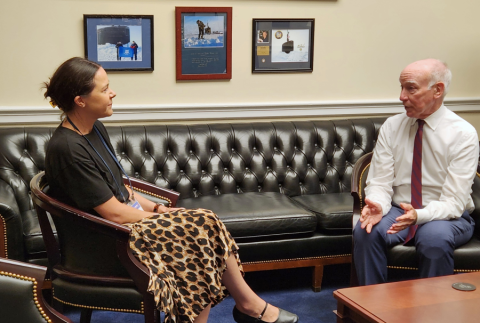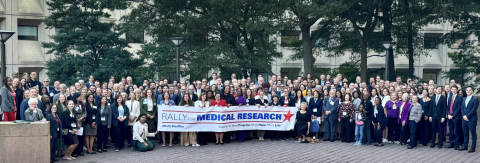Read time: 5 minutes.
In the winter of 2018, I had a lingering cough, nothing out of the ordinary for a Boston winter. At the time, I had just celebrated my first wedding anniversary with my husband, Jack, and I was 31 years old, living a healthy, active life. I didn't have any major risk factors. Lung cancer wasn’t even on my radar.
But friends kept urging me to get the cough checked out. That one small decision led to a diagnosis I never could have imagined: stage IV ALK-positive non-small cell lung cancer (NSCLC).
I’ll never forget sitting in the exam room when I heard those words. It felt surreal. Cruel. My grandfather had died of lung cancer after decades of smoking, so like so many others, I’d always thought of it as an older smoker’s disease. I never imagined it could be me.
In the weeks after my diagnosis, I started writing emails to friends and family to keep them updated. The outpouring of love and support was overwhelming in the best way. It gave me strength. Eventually, I created a CaringBridge site and started documenting the ups and downs, the milestones, the small victories. Writing helped me process everything and it helped me feel less alone.
Over time, I felt a deeper pull to share my story publicly, not just for myself but for others. I wanted to raise awareness and challenge the stigma that still surrounds this disease. I wanted people to see that lung cancer doesn’t look one specific way and that, yes, anyone with lungs can get lung cancer.
I also wanted to stand with the many young women like me who have been diagnosed with ALK-positive NSCLC in recent years. Sharing my experience became a way to bring visibility, compassion, and urgency to a disease that is still so misunderstood.
Since then, advocacy has become a meaningful and evolving part of my life.

I’ve shared my story and volunteered with several lung cancer advocacy groups to raise awareness that anyone with lungs can get lung cancer. I’ve helped organize fundraising efforts to support lifesaving research and offered one-on-one support to others navigating their own diagnoses. Along the way, I’ve also had opportunities to share my journey through various platforms, bringing visibility and hope to the community.
But one of the most empowering experiences I’ve had as an advocate was attending the Rally for Medical Research in Washington, DC, with LUNGevity. I met with Connecticut’s congressional representatives to advocate for National Institute of Health (NIH) funding and talk about why continued investment in medical research is absolutely critical. Meeting my congressman, Rep. Joe Courtney, and being invited to share my story on camera for his constituents was surreal and deeply meaningful. When that video was shared widely and received with so much support, I felt the impact of advocacy in a whole new way.
My hope is that my advocacy helps break the stigma around lung cancer and drives increased funding for research. We’ve seen incredible advances, from targeted therapies to promising vaccines, but federal funding is constantly at risk. If that disappears, so do the clinical trials and progress that so many of us rely on.
That’s why I keep speaking up. Why I keep showing up. I want to use my voice and my story to show lawmakers, researchers, and the public that this funding matters. Lives, including mine, depend on it.
If you’re thinking about getting involved in advocacy, my best advice is this: start where you are. You don’t have to commit to one path. You can share your story in so many different ways, and it doesn’t have to look like anyone else’s version of advocacy. For a while, I thought I had to pick one lane, but I’ve learned that advocacy can evolve with you.

Most importantly, trust your gut. Don’t worry about what others might think. When I was first diagnosed, I felt embarrassed. I carried this misplaced guilt, like I had done something wrong. It took time, therapy, and the love of the people around me to let that go. Embracing my story helped me take back my power. Now I try to use that power to spark change, challenge stigma, and hopefully inspire others to do the same.
So, what gives me hope?
The people: the oncologists, the researchers, the fellow advocates and survivors who keep fighting, who keep showing up. This is not a club I ever wanted to be in, but I’m endlessly grateful for the community I’ve found in it. Their strength, compassion, and progress give me hope, not just for myself but for the future.
At home, life is full and joyful in ways I never take for granted. I live in Old Lyme, Connecticut, with Jack and our yellow lab mix, Louie. I love traveling. My most recent adventure was to Peru with my mom. I’ve rediscovered a love for tap dancing. I danced growing up, and tap was always my favorite. Picking it back up as an adult has been pure fun. I even perform in recitals. It’s just one of the ways I stay grounded and connected to joy.
Lung cancer changed my life in ways I never imagined. But it also gave me purpose, connection, and a platform. I will keep telling my story for myself, for the people I love, and for all the others still waiting to be heard.
You can advocate for research funding and get action alerts sent directly to your inbox by signing up for LUNGevity Action Network emails. We let you know when your voice is needed and keep you updated on important issues related to lung cancer.

